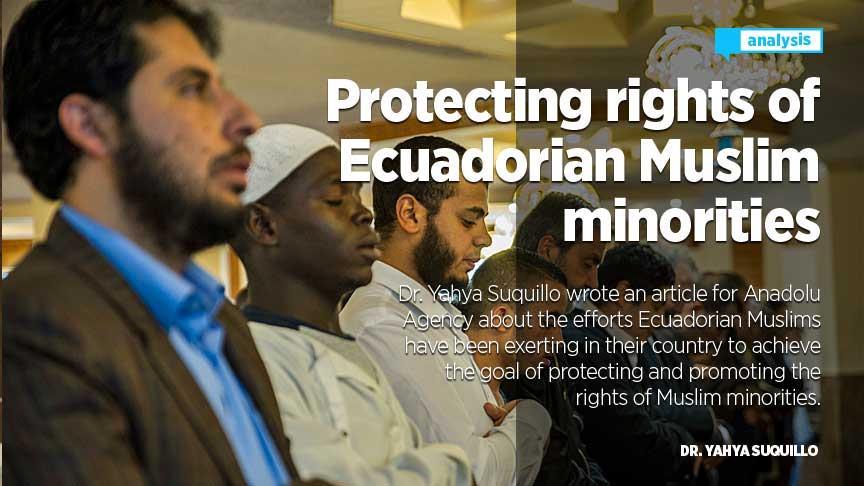ANALYSIS - Protecting human rights of Ecuadorian Muslim minorities
Dr. Yahya Suquillo wrote an article for Anadolu Agency about the efforts Ecuadorian Muslims have been exerting in their country to achieve the goal of protecting and promoting the rights of Muslim minorities

By Dr. Yahya Suquillo
The writer is Director of Islamic Center of Ecuador.
QUITO, Ecuador
To give a brief history of the events that have led us to the current situation we now have, we have to take into consideration that Ecuador and other Latin American countries have had a long history of state-church relations. In Ecuador, we lived over 100 years of extreme conservatism.
Recently,
The truth of the matter is that statesmen align themselves with the religious figures of the majority religion in order to attract votes and to ensure their loyalty in upcoming elections.
Experiences of Ecuadorian Muslims
In 2011, all religious denominations were called by the central government of Ecuador with the objective to analyze a new religious spectrum. At the time there were 2,000 religious denominations, currently, there are over 3,000.
People from most of these religious communities attended workshops and panels in order to discuss liberty and equality of religion. There were 16 final drafters, and all praise be to Allah, I was one of them. We worked on drafting and presenting a proposal to the government, which would hopefully bring about more equality to all religions.
Solutions and Recommendations to Protect the rights of Ecuadorian Muslims
Creating these safe spaces for Muslim communities to develop is of utmost importance. With
Another relevant aspect is that legality and proper registration brings a sense of security to the members of our community. If our mosques are legally recognized before the law, we can have the right to advocate for our rights and protect our growing Muslim community.
We are advocating for the removal of taxes from donations coming from abroad but also those which are domestically given. Our religious institutions are not exempted from taxes on
Some of our Muslim volunteers who cooperate in our da’wah (religious preaching and propagation) tables or help the institution in da’wah trips, do not have a safety net when it comes to healthcare. We propose as a mosque to contribute to the state economically in case one of our Muslim volunteers suffers from an accident. In this manner, we are safeguarding our Muslim volunteers’ right to healthcare.
Creating pressure groups to derogate or abolish the Modus Vivendi is one of our greatest projects and strong recommendations to all those countries who face a similar reality.
The Modus Vivendi is an interstate agreement done between two sovereign states; typically a Latin American state and the Vatican. This agreement entails virtually a relationship of subjugation, wherein the “sovereign” state has to comply with the conditions of the Vatican in regards to the treatment the state ought to give to Catholic religious representatives.
Some of these conditions include:
- Full tax exemption to Catholic religious leaders and churches.
- The appointed bishop for the Ecuadorian armed forces ought to earn as much as the General Commandant.
- Catholic religious leaders ought to hold a special passport.
- The government ought to finance education for Catholic schools.
- The government ought to cover all costs of pastoral visits coming from abroad into the country.
- The Vatican Vicar ought to be present at meetings between the minister of Foreign Relations and ambassadors of other states.
The remaining points of this long list are beyond the scope of this article. However, it is of utmost importance to note that these privileges given to a single religious denomination and disregarding other communities
The Muslim Community of Ecuador as founder member of
Given the reality that most Muslims face in non-Muslim majority countries, it is important that we seek the help and cooperation of embassies of Muslim majority countries. We have asked for information and data pertaining these countries’ constitutions in regards to equality of religion. We have been honored to ask the embassy of the Republic of Turkey in Ecuador for this valuable information. This is considerably useful and practical to present to our own countries as examples of good governance. If we present this information to our government with a draft law and examples of equality of religions in Muslim countries, it could have the potential of bringing about a better future for our Muslim communities.
How we self-identify
Latino Muslims are taxpayers as well as full participants in the process of political election in democratic Latin American states. Therefore, the Latino Muslim communities are dramatically changing the concept of “religious minority”. We, Latino Muslims, have not gone through the process of integration because we have always been pivotal actors in the development of our countries of origin. Latino Muslims may not refrain from fulfilling civic and patriotic acts.
The Latino Muslim culture is an emerging culture, which is intrinsically part of the ummah (the global community of Muslims), and we would rather not consider ourselves a “minority”. The dialectic process might take some time to dismantle the archaic concept of Islam vs. the West, and by default, to knock down all academic productions of “Fiqh al Aqalliyat” (the jurisprudence regarding the “minorities”).
Living in the West is the resurrection of the “New Andalusia.” For this reason, we feel empowered enough to advocate for our human rights as a Muslim community that has always been fully integrated into society from its beginnings.
*Opinions expressed in this article are the author’s own and do not necessarily reflect the editorial policy of Anadolu Agency.
Anadolu Agency website contains only a portion of the news stories offered to subscribers in the AA News Broadcasting System (HAS), and in summarized form. Please contact us for subscription options.





